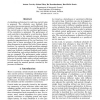Free Online Productivity Tools
i2Speak
i2Symbol
i2OCR
iTex2Img
iWeb2Print
iWeb2Shot
i2Type
iPdf2Split
iPdf2Merge
i2Bopomofo
i2Arabic
i2Style
i2Image
i2PDF
iLatex2Rtf
Sci2ools
105
click to vote
RTS
2002
2002
Feedback-Feedforward Scheduling of Control Tasks
A scheduling architecture for real-time control tasks is proposed. The scheduler uses feedback from execution-time measurements and feedforward from workload changes to adjust the sampling periods of the control tasks so that the combined performance of the controllers is optimized. The performance of each controller is described by a cost function. Based on the solution to the optimal resource allocation problem, explicit solutions are derived for linear and quadratic approximations of the cost functions. It is shown that a linear rescaling of the nominal sampling frequencies is optimal for both of these approximations. An extensive inverted pendulum example is presented, where the performance obtained with open-loop, feedback, combined feedback and feedforward scheduling, and earliest-deadline first scheduling are compared. The performance under earliestdeadline first scheduling is explained by studying the behavior of periodic tasks under overload conditions. It is shown that the a...
Related Content
| Added | 23 Dec 2010 |
| Updated | 23 Dec 2010 |
| Type | Journal |
| Year | 2002 |
| Where | RTS |
| Authors | Anton Cervin, Johan Eker, Bo Bernhardsson, Karl-Erik Årzén |
Comments (0)

